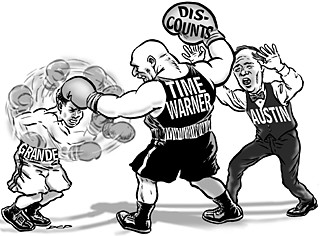David (and Jesus) vs. Goliath
The city alleges that Time Warner Cable is offering illegal discounts to snuff out competition.
By Lee Nichols, Fri., Feb. 15, 2002

Time Warner Cable is engaging in an illegal, "under the table," pricing scheme designed to eliminate competition before it even starts, according to a letter from the city of Austin to the Federal Communications Commission. Sent by City Manager Jesus Garza after being approved by the City Council on Jan. 31, the letter is a response to Time Warner's legal petition to the FCC to declare Austin a market with "effective competition." Such a declaration would free Time Warner, Austin's dominant cable provider, from city pricing regulations.
Time Warner, which provides both cable television and high-speed Internet service to the entire Austin area, asserts that the presence of Grande Communications -- a new, San Marcos-based cable provider currently offering residential television, Internet, and local and long-distance phone service to parts of East Austin -- constitutes competition. They've been offering reduced rates to former subscribers to win them back from Grande.
However, Grande and the city say Austin doesn't yet meet the FCC's definition of a competitive market, and have asked the FCC to deny Time Warner's petition. The "win back" offer, the city alleges, violates commission rules mandating uniform rates throughout a geographic service area, and is, in fact, an attempt by the cable giant to kill Grande and prevent competition from ever happening. Grande plans to eventually lay the cable necessary to service all of Austin and become a full-fledged competitor, but says that rollout won't be completed for another five to seven years.
In the harshest part of the letter, Garza points out that FCC requirements state that promotional plans such as the "win back" offer "must be universally available to all consumers in a geographic area served by the provider." However, Garza alleges, Time Warner does not publicize the offer to customers living outside Grande's service area. "The pricing scheme is being administered under the table," Garza wrote. "It is publicized only to those individuals living in areas serviced by Grande who have switched services from Time Warner. There can be no doubt that this marketing strategy is meant only to threaten Grande's competitive presence."
Most importantly, Garza said, approval of Time Warner's petition to the FCC for "effective competition" could drastically change the competitive landscape. "Time Warner, with its market strength and financial reserve, will attempt to eradicate any competitive upstart," he said. While customers in a small area of town may temporarily benefit from a short-term price war, Garza forecasted that "upon eliminating Grande, Time Warner will be Austin's sole cable provider and will raise rates once again."
Time Warner spokeswoman Lidia Agraz said Garza's predictions aren't accurate. The offer he refers to originally started for customers who owned satellite dishes, she said, and "is an offer that we have for any customer that leaves our service or that is receiving a service from a competitor. ... Our promotional offer does not do what the city claims that it does. The promotion is not offered in [just the] one geographical area where Grande is." But Rondella Pugh, the city's officer for telecommunications and regulatory affairs, says that's irrelevant. Time Warner can't offer selectively targeted rates because the FCC hasn't yet declared that open competition exists here. "We believe that the cable company should offer the same rate to all customers in the Time Warner service area in Austin," Pugh says, not just competitors' customers.
Whether Time Warner gets its way and can continue the pricing offers ultimately will depend on whose definition of "effective competition" the FCC accepts. Section 623(l) of the federal Telecommunications Act lays out four criteria determining whether competition exists; only one must be met. The city seems to rely most heavily on the second criterion, which mandates that a market must be served by two companies, "each of which offers comparable video programming to at least 50% of the households in the franchise area." Time Warner is available to an estimated 265,000 households in the Austin area; the city says only 13,000 (less than 5%) have access to Grande.
But Time Warner is leaning on the fourth criterion, which says competition exists when a "local exchange carrier" (LEC -- basically, a phone company) offers "comparable" video services in a franchise area. This fourth test does not specify a minimum number of potential customers, a fact Time Warner carefully pointed out in its own letter to the FCC. Yet the company seems to be standing on shaky ground: The FCC has previously said it "rejects arguments advocated by cable interests that any service offering in the franchise area, no matter how minimal, should be sufficient for a finding of effective competition," and that LECs must first have a "ubiquitous presence in the market."
Time Warner has complained that the city is understating Grande's presence in the market. Grande provides exclusive service to at least 19 apartment complexes located throughout Austin, even outside the East Austin area to which it is currently limited by the rollout plan, representatives note. Grande and the city both counter that the apartment service is through a separate side deal with another LEC named U.S. Online, and may not be relevant to this argument. In any case, even Time Warner admits this may add only another 5,000 customers.
The city's letter of opposition complements one sent in January by Grande itself, making similar assertions and pleading lack of sufficient market presence to be competitive. "We're delighted that the city of Austin is taking an interest," says Martha Smiley, an executive vice president at Grande. "Our presence is [minimal]; we are not effective competition. We are only serving a small area. ... I don't think there's any question that [the offer] is to take back customers from us."
The FCC did not return phone calls, and it is not known when they might deliver a ruling.
Got something to say on the subject? Send a letter to the editor.








